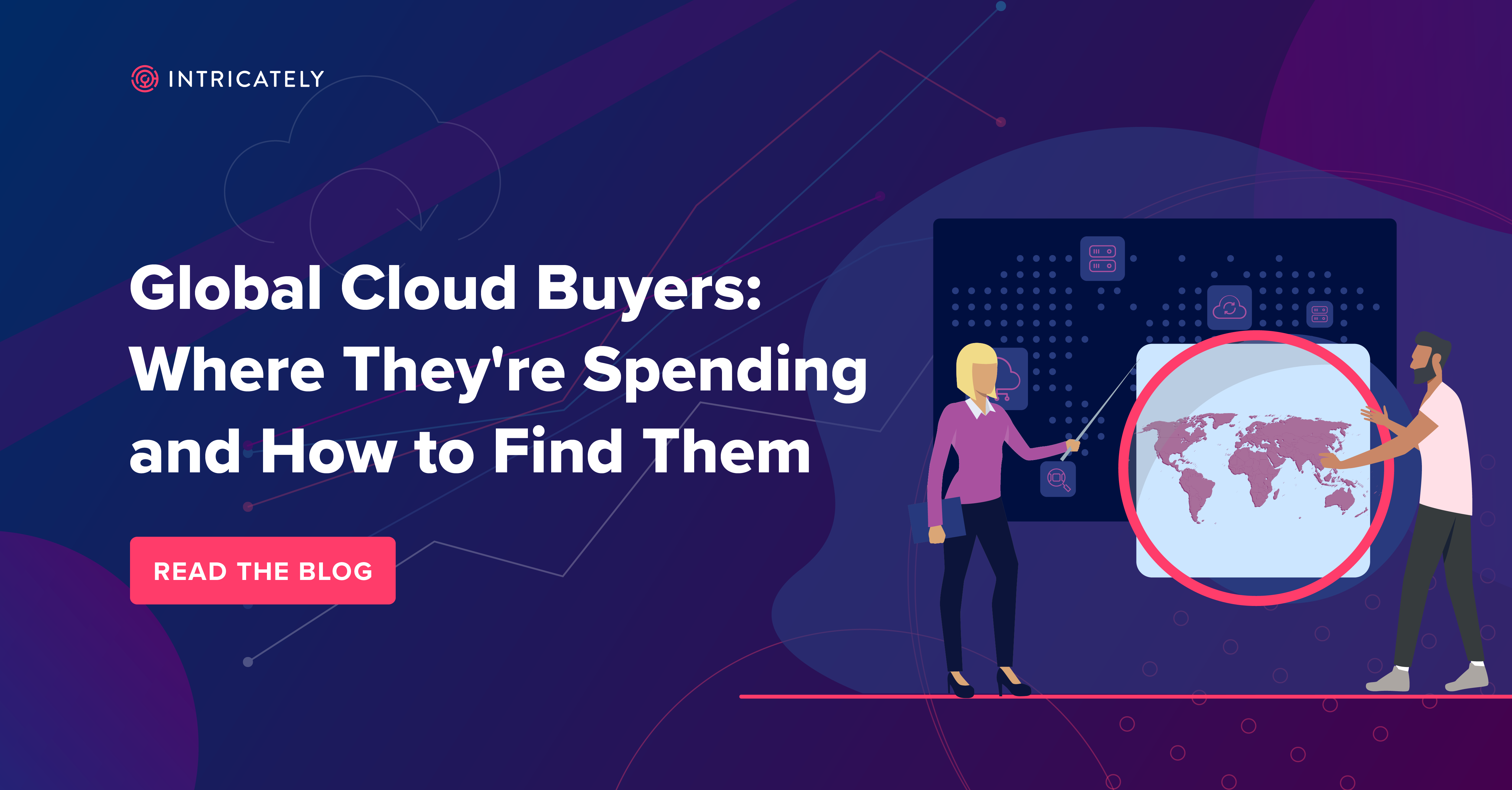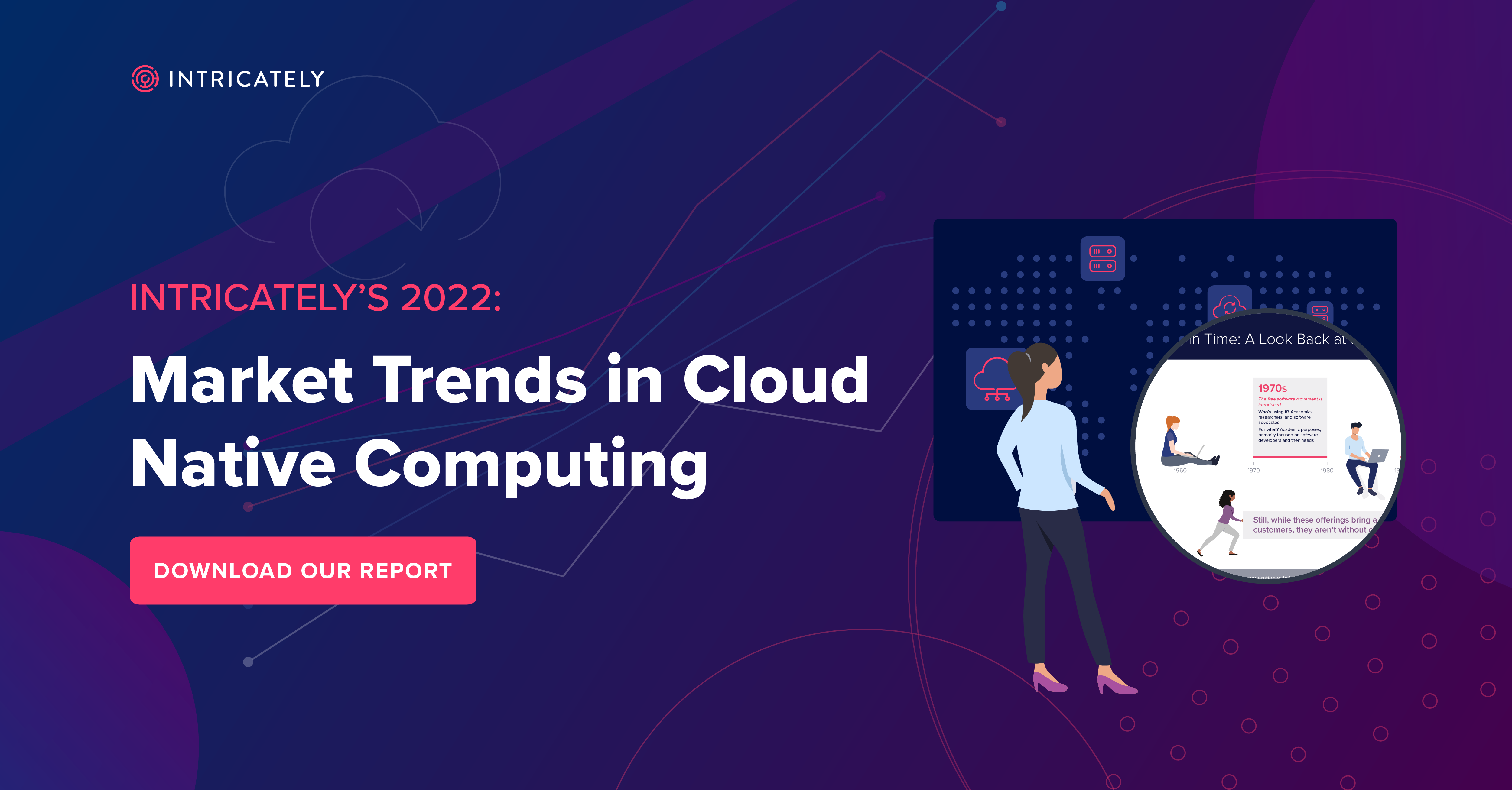
 back to all posts
back to all posts
Comparing the Largest Data Center Companies

Enterprise companies are racing to invest in data centers. Why? The booming cloud market shows no sign of slowing down. Prior to the global pandemic, Gartner predicted cloud computing revenue would exceed $266 billion in 2020. Considering that streaming, online communication, and rapid digital transformation unexpectedly took center stage in 2020, data centers are exceeding that growth heading into 2021.
We evaluate today's data center market and use Intricately data to map out the seven largest data center providers making it happen.
Trends in the 2021 data center market
The massive amount of data stored and processed in the cloud requires a huge global footprint of infrastructure and networks found in data centers. Data centers make the internet—and essentially our modern world—run smoothly.
Here are some trends shaping the market to understand how large data center providers serve cloud providers and other businesses.Companies of all sizes are moving towards cloud data center providers
AWS has led the market for years in cloud computing, but other firms are making strides in catching up. Microsoft won the Pentagon’s JEDI cloud-computing contract, worth $10 billion. Last year, IBM purchased RedHat for $34 billion, stating that “the acquisition redefines the cloud market for business,” with a particular focus on hybrid cloud opportunities and open source technologies.
Businesses are moving to the cloud rapidly because outsourcing IT and infrastructure offers many benefits to businesses:
- Reduced startup costs: Businesses no longer need to pay large sums of up-front capital costs on infrastructure that will depreciate in value. By outsourcing infrastructure costs, this capital expense becomes an operational expense.
- More affordable: It’s expensive to build and maintain the amount of servers needed to handle spikes in traffic or plan for emergencies. When companies outsource servers, they essentially share the load with other companies. The pay-as-you-consume model is more affordable for companies even as large as Netflix, which has always used AWS for its computing and storage needs.
- More flexible and scalable: Data centers can handle spikes in traffic better, scale with your business, and are easily deployable for SaaS products.
On-Premise Data Center Providers Present Challenges
Not only are there clear benefits to moving to the cloud, managing on-premise data centers presents major challenges. At the beginning of 2020, only 29% of leaders and engineers said their data centers met their current needs. On top of that, only 1% of engineers said their data centers were primed for higher data volumes.
Between the major shift to the cloud among businesses and the increasing challenges of maintaining on-premise data centers, it’s not surprising that the outsourced data center market is growing.
Covid-19 Escalated the Pace of Cloud Data Center Deployments
The global Covid-19 pandemic accelerated the shift of application and data management to the cloud. Dan Ives of Wedbush Securities said that Covid-19 presented a “key turning point” in the cloud deployment market. Previous estimates of 55% of workloads moving to the cloud by 2022 now look conservative.
With people stuck at home and online more, many businesses pivoted to meet changing needs of consumers or clients. This uptick in data needed to be stored and analyzed somewhere. Using major cloud providers, like AWS, can be done easily, whereas finding new IT support and quickly building on-premise infrastructure is a much larger feat.
What Does the Cloud Have To Do With Data Center Companies?
Cloud provider giants like Amazon, Microsoft, and Google need physical data centers to provide their services. While they own their own data centers around the globe and lead the charge in building new data centers, they also lease roughly 70% of their data center footprint from data centers owned by other companies. Cloud providers maintain control over the servers and networks, but they pay someone else to manage and maintain the building—known as colocation services. With increased deployment of applications to the cloud, data centers and their partners have a tremendous opportunity to capitalize on this growth.
So, who are the largest commercial data center operators supporting businesses—including the likes of Amazon, Microsoft, and Google—with their data center needs?
The Largest Data Center Providers
Intricately’s Global Sensor Network, deployed across more than 150 points of presence (PoPs), maintains a comprehensive view into how organizations deploy, utilize, and invest in digital products, applications, and ecosystems. Using this network, Intricately can analyze which major data center providers host the highest amount of applications in their data centers.
Comparing the largest data center providers
1. Lumen (CenturyLink) - A date center provider for enterprise, residential and small businesses
In September 2020, CenturyLink rebranded as Lumen. Lumen serves three customer segments: enterprise, small business, and residential.
Lumen has more than 350 data centers and 2,200 public net data centers. It offers additional services, such as communications, network services, security, cloud solutions, voice, and managed services. Lumen serves global enterprise customers across North America, Latin America, EMEA, and Asia Pacific.
In 2017, CenturyLink acquired Level 3 Communications—giving it a far reaching digital footprint, high-quality technology solutions, and a reliable fiber-rich network. This major deal set them up to be a success with large enterprises.
Our most recent data shows that it hosts more than 140,000 applications in its data centers.
Key customers include Amazon, Google, and YouTube.
2. Digital Realty - A global data center company
Digital realty is one of the largest data center, collocation, and peering service providers in the world. It boasts more than 280 data centers, across 20 countries and six continents.
Digital realty offers move-in ready cages and cabinets for businesses looking for a hybrid solution. Additionally, it features private suites for companies that want the privacy and control of having an on-prem data center, but don’t want to have large CapEx costs upfront. Enterprises can also build fully customized data centers to fit their unique security and compliance needs.
More than 2,300 organizations trust Digital Realty to make their data safe and meet their compliance needs.
Digital Realty is also unique in that they are highly committed to sustainability—which is becoming increasingly important to enterprises. Their green data centers are leaders in green building, use 100% wind power, and are energy efficient.
Key customers include Wikipedia, Avature, and Open Society Foundations.
3. Equinix - An enterprise data center provider
Equinix offers a vast network of interconnected data centers. They provide more than 200 IBX data centers on five continents.
Equinix comes close to Lumen in hosted application quantity—hosting over 125,000 applications. When looking at the size distribution of its customers, Equinix has more enterprise customers than Lumen. However, Lumen captured more mid-market customers. They are known for their fast application performance, low latency routes, and far- reaching digital ecosystem.
Key customers include Electronic Arts, GitHub, BBC News, and Gartner.
4. NTT Communications - Over 90,000 applications hosted by their data centers
NTT is a $107-billion organization with more than 300,000 employees in 88 countries. It’s ranked 64th in the Fortune Global 500 and partners with up to 88% of the Fortune Global 100 companies. It has more than 140 data centers and the most recent data suggests it hosts about 90,000 applications.
NTT Communications specializes in consultancy, architecture, security, and cloud services for enterprise networking environments.
Key customers include Alibaba Group, the NFL, Cisco, UNIQLO.
5. Cyxtera - A data center provider known for its cloud and hybrid ready security
Cyxtera offers data center colocation, enterprise bare metal, and interconnectivity services across 62 data centers around the world. It’s notable for its cloud- and hybrid-ready security and analytics products. Cyxtera was built on the platform of the former CenturyLink data center portfolio.
Cyxtera was officially separated from CenturyLink in 2017. The most recent data suggests that it hosts more than 60,000 applications.
Key Customers include Staples, Charles Schwab, and Logitech.
6. BT - A UK-based data center provier
A UK-based telecommunications company, BT Business offers cloud-based data center solutions with 48 data centers primarily in Europe. They also have one in the United States in New Jersey.
The company's three solutions are:
- BT Private Compute: A single enterprise-class platform, over which an organization can run all its IT, including network, storage, computing, security and applications.
- BT Managed Compute: A fully managed Infrastructure as a Service (IaaS) solution for core IT infrastructure
- BT Cloud Compute: A pre-provisioned data centre infrastructure that enables businesses to create, deploy, monitor and manage their own cloud service. It is owned and Managed by BT, but features self-service via a portal.
7. Data Foundry - Enterprise and startup data center provider
Data Foundry is a premier data colocation center based in Texas. Data Foundry has six data centers. Though this is much less than the previous data center providers, they carry their weight by hosting more than 70,00 applications.
It offers services for enterprises, SMBs, and startups across industries such as energy, finance, healthcare, and technology. Its target customer is SMBs and startups.
Key customers include Informatica, LegalZoom, Kate Spade, the Texas Department of Family and Protective Services.
Largest Data Center Companies: Turn Your Data Into Revenue
Knowing how potential customers spend and what their preferred app hosting models are will yield better sales opportunities. Our Global Sensor Network is designed to give you a comprehensive look at how a company is consuming and spending on the cloud. With Intricately, data center providers and cloud sellers can see what makes up their prospects’ digital infrastructure and spend.
Learn more about application deployment in the cloud by downloading our 2021 State of App Deployment Report.
Schedule a demo today to learn how Intricately can help your team engage more prospects, prioritize opportunities, monitor your competition, and more.

3 Trends Shaping the Evolving Cloud Hosting Market

4 Ways Cloud Marketing Leaders Can Get the Most From Their Budgets in 2022

How to Perform Account Segmentation and Prioritization



Introducing Intricately's 2022 Market Trends in Cloud-Native Computing


Breaking Down The Top Five Cloud Security Providers

